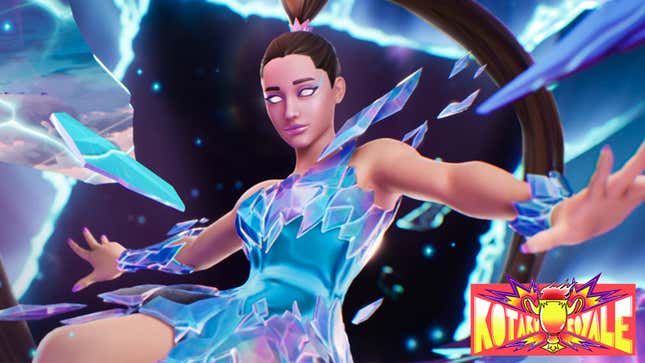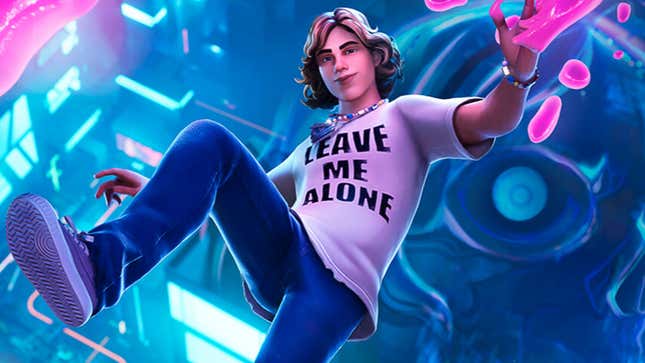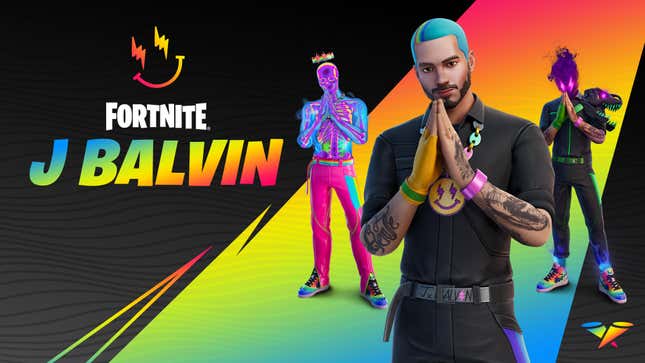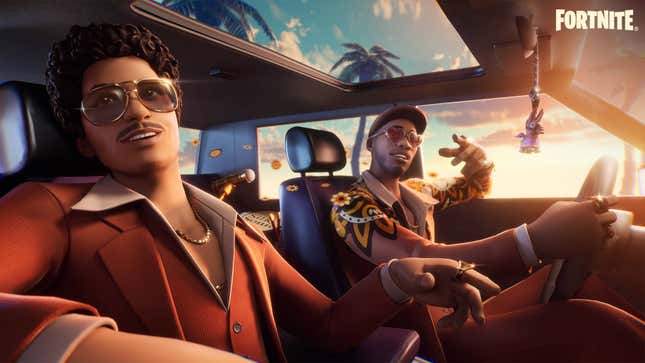
The blockbuster industries of pop music and gaming have been collaborating for almost as long as games have existed—at least since 1983, when Journey got their very own Midway arcade cabinet. Those kinds of branded crossovers have only grown with time, especially in online games like Fortnite, which has transformed from a straightforward multiplayer battle royale to a unique multimedia experience. Pop music has had an audible presence in Fortnite for years now, with artists like Travis Scott and Ariana Grande spearheading the virtual concert trend that’s spread to other platforms like Roblox.
Epic Games even has purchasable skins modeled on musicians like Bruno Mars, J Balvin, and Kid Laroi, and countless emotes featuring every song from “Gangnam Style” to “Pump Up The Jam” to NBA Youngboy’s “Right Foot Creep.” There’s a feedback loop between the music you hear in Fortnite and music that goes viral elsewhere: sometimes I can’t tell if a song is in Fortnite because it’s a TikTok trend, or if it’s a TikTok trend because it was in Fortnite.
You’re now listening to Fortnite radio

Fortnite introduced its in-game radio feature as a fun easter egg for players in June 2020, with stations like “Beat Box” and “Rock & Royale” available for your listening pleasure whenever you entered a vehicle, and a new selection of songs featured every time an update or season released. Initially, the featured music skewed toward what you might expect to hear in an online game already, mostly instrumental pieces from Fortnite’s own soundtrack, glitchy electronic cuts, and lo-fi beats. Then it started to change.
Where most of Epic’s previous collaborations with musicians have been visual, the expansion of the in-game radio created a new auditory market for placing music in the game—in my own hours logged in the game, I’ve heard everything on Fortnite’s radio stations from Drake to German techno, from Rosalía to Korn. And now, Epic Games has taken its music licensing to an entirely new dimension, as the battle royale has begun to position itself not just as a virtual billboard for promoting pop artists, but as its own kind of full-service streaming platform.
Of course, the obvious model here is something like Grand Theft Auto, which has featured extensive music curation on its stations from artists like Flying Lotus and The Blessed Madonna. But games like GTA are fundamentally more static than Fortnite—the soundtrack might be new when the game drops, but it will inevitably become dated until the next DLC comes out. Fortnite’s existence as a never-ending online experience, with new seasons of content and constant updates, has allowed for the growth of an entirely new market, as Epic can perpetually refresh its own playlists.
Increasingly, Fortnite has been offering up a space for artists who aren’t brand names, or who work in genres that aren’t what we conventionally think of as “video game music.” Chris Burque is one of the co-founders of Ghost Town, a company that handles media licensing for artists like Sufjan Stevens and Son Lux. With a client list skewing toward indie and experimental music, Ghost Town has generally done more work in film and television than gaming, but the Chicago-based firm has licensed music to critical darlings like Hotline Miami and Life Is Strange, and helped curate a soundtrack of local Chicago artists for the first Watch Dogs game. Since the expansion of Fortnite’s in-game radio service, Ghost Town has seen a growth of its business in the gaming sector, as Epic Games draws together a diverse spectrum of sounds to accommodate its equally diverse playerbase.
Fortnite and music licenses

Regardless of any specific genre or artists, Burque explains that when Epic has reached out to his company with licensing opportunities, they’re more interested in what’s new and upcoming than any one specific sound—the first song Ghost Town licensed to Fortnite was from Sufjan Stevens and Angelo de Augustine’s 2021 album A Beginner’s Mind.
Since its purchase of Bandcamp, Epic also has its own stream of readily-available indie music to pull from, with a Bandcamp-curated selection recently featured on the game’s Radio Underground station. Even if Fortnite still represents a smaller share of Ghost Town’s business than television, Burque sees this emergent platform as representative of a larger boom in streaming content: “Especially over the last few years, there’s just a never-ending stream of content being created, so there are more opportunities to license music than ever before, even if it’s just a song playing in the background of a bar in a TV show.” Fortnite offers a similar potential for optimizing the background as, say, a party scene in Succession, as Epic finds new spaces where licensed music can be inserted.
Josh Briggs oversees the licensing team at Terrorbird Media, a full-service music management company and label that also handles publishing for artists like Deerhoof, Kathleen Hanna, and Shamir. “At Terrorbird, we especially focus on artists you might consider left-of-center, so we’re always looking for mainstream outlets for that kind of music,” he explains. “It’s exciting when something like Fortnite comes along in a space like gaming that’s been harder to tap.” Briggs notes that in the past, the bulk of Terrorbird’s work with game developers has been for promotional purposes—their first game-related license was the use of a song in a commercial for the PlayStation Vita.
Alongside Grand Theft Auto, Briggs notes titles like Guitar Hero and Tony Hawk Pro Skater as games that helped open the genre up to a diverse range of music genres, alongside licensing powerhouses like FIFA and 2K. But unlike Fortnite, those games have still been limited to a more confined soundtrack—in many ways, having a track licensed to Fortnite is more like receiving placement on a Spotify or Apple Music playlist than being featured in a conventional video game.
The Fortnite bump

It’s obviously still a beneficial financial opportunity for artists, but Briggs notes that placement in a game like Fortnite doesn’t necessarily lead to greater exposure: You spend less of the game inside a car than something like GTA, so there’s fewer opportunities to fully survey all the stations, and a track might come and go from the game’s playlist before you even have the chance to hear it. Additionally, there’s no DJ to read out the track or artist name, and probably little time to pull out your phone and Shazam something that catches your ear, given the fast pace of the game.
He explains, “The hard part is, how do you take someone from being obsessed with your song in Fortnite, and get them to leapfrog out of the closed ecosystem to the rest of your catalog, or to seeing you play live?” Licensing to a platform like Fortnite offers a new revenue stream, and it can be a novel achievement for musicians who are themselves gamers, but it’s difficult to discern what kind of impact it actually has on broader listenership.
Briggs points out that Epic’s increased interest in the music space is part of a larger strategy that almost every content provider is adopting: In a bid for fractured attention, streaming platforms are increasingly transforming into multimedia spaces that attempt to satisfy all of our sensory needs. “A huge driver for streaming platforms is time spent on the platform, so they’re doing anything they can to keep people in their ecosystem, which I think means a conscious effort to consolidate. Like, why leave to go sit and listen to Spotify when they can bring music to you? Why jump to Netflix or Twitch or TikTok if we can bring what they do here? If you’re hanging out with your friends all the time in Fortnite, that becomes where you listen to music or go to concerts, instead of going to another platform.”
Of course, some of those fans are the very musicians whose music might end up on Fortnite radio. “So many artists are gamers,” says Briggs. “Touring or in the studio, there can be intense moments of downtime for musicians. We’re waiting for soundcheck, or we’re driving to the next spot, or we’re waiting for the drums to be recorded, so we’re hanging out here and playing the Switch to pass the time.”
The expansion of music licensing in Fortnite shows just how deeply embedded multiplayer gaming has become in pop culture, as the battle royale transforms from a straight-forward game concept to a massive streaming portal for media of all stripes. “A constant conversation with our artists is not just how do you monetize music, but how do you connect with fans?” explains Briggs. “If your fans are spending their social time on a platform like Fortnite, you have to meet them there.”

